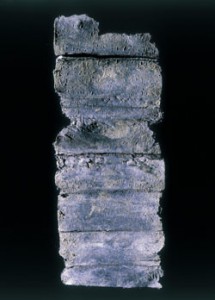 A team of archaeologists from Kyoto University have found a lead tablet inscribed with a curse written in Greek. It dates to between the 2nd and 4th century A.D.
A team of archaeologists from Kyoto University have found a lead tablet inscribed with a curse written in Greek. It dates to between the 2nd and 4th century A.D.
The 6-cm-wide, 14.7-cm-long plate, discovered near the entrance of an underground grave, is adorned with ancient Greek text that reads “May the unjust be removed from them” and “May signs of a gag and shame, and disgrace be given to them,” along with the names of four people, the team said Tuesday.
The article describes the curse as “invoking the spirits of the dead,” but curse tablets were fairly widespread in the ancient world and don’t always invoke a specific power, be it a spirit of the dead or another deity. There’s nothing in the text as presented in the article that indicated the spirits of the dead were particularly involved.
Perhaps it’s the locus of the find that underlies the assumption. Buried curses are thought to have been placed close to the gods of the underground to draw their power. The location of the curse was certainly connected to the curse itself. Most of the defixiones (the Latin term for ancient curses) found in Britain, for instance, were discovered near health spas, in the same places where prayers for good health were left. The spa giveth and the spa taketh away, to coin a phrase.
Interestingly, many of the extant Greek curses are over legal matters.
Most of the curses are what we call binding spells: they aim at binding or inhibiting the performance of a rival. A lot of them have to do with legal cases. They say things like, “Bind the tongue and the thoughts of so-and-so, who is about to testify against me on Monday.” We have some that are aimed at rival musicians or actors, and a couple that seem to be connected with athletics. We have some that run something like this, “Bind Helen, so that she is unsuccessful when she flirts or makes love with Demetrius.” But the great majority of them seem to be connected with lawsuits. This actually corroborates evidence from other sources suggesting that the Greeks thought Athenians were abnormally enamored of lawsuits–much as many Americans today think that New Yorkers are especially litigious.
Now you’re just taunting me. :brooding:
There, there… Maybe those parts are just covered in dirt.